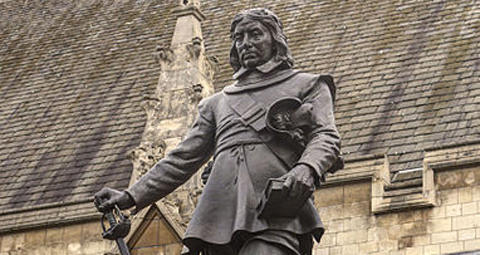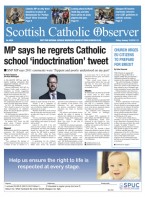January 18 | ![]() 0 COMMENTS
0 COMMENTS ![]() print
print

Cromwell ordered priests to be clubbed to death and massacred the Irish—his statue has no place at Westminster
Labour MP Stephen Pound writes following a heated debate surrounding a bust of Cromwell at the UK parliament.
There has been a very large amount of publicity recently concerning the hard metal bust of Oliver Cromwell that was positioned just outside the Members’ tea room in the House of Commons.
Since last summer, the glowering presence of the Lord Protector was regularly turned to face the wall in what I am assured was a solemn and silent protest at the presence of so many representations of the Butcher of Drogheda in the Palace of Westminster.
I am admitting nothing but had been identified as someone who might have been responsible for the mild rebuke and I was as delighted as many when the bust disappeared.
My joy was dimmed when the bust appeared outside my office, some way from the tea room, and was installed with the addition of a trembler alarm and significant warning notices.
What at first sight may seem a silly season non-story actually conceals a very significant truth.
Parliament is littered with portraits, statues and busts of Cromwell: we have a Cromwell Lobby and outside Westminster Hall there is the Cromwell Green where the baleful presence glowers down at us each day.
Cromwell was the victor of the civil wars in the 17th century and established a ‘commonwealth’ that was actually an autocracy. His legacy survived for two years after his death and there is little affection for a return to dictatorship in these islands.
The objection that many have is to the fact that Cromwell was a Puritan jihadi with no tolerance for any other faith save his distinctive strand of Protestantism.
His hatred of the Catholics that he referred to as ‘barbarous wretches’ was matched by his contempt for other faiths and, while his readmission of the Jews to the land is hailed as an example of a previously undetected ecumenism, it was actually a commercial decision aimed at attracting Jewish finance to rebuild a war- shattered economy.
Cromwell’s behaviour in Drogheda and Wexford in 1649 places him, in my opinion, so far beyond the pale of civilisation as to make him wholly unworthy of his widespread presence in Westminster.
The details of the Massacre of Drogheda are well known: the slaughter of the surrendered, the burning alive of over 30 Royalists and soldiers of the Catholic Federation and the deliberate and brutal clubbing to death of all priests and friars.
Cromwell’s order in respect of the religious was to ‘knock them on the head.’
His chill words to the widows and orphans who survived and who asked where they could now go as their city was sacked, ‘You may go to Hell or to Connacht, I care not which,’ still resonate.
Transporting thousands of Irish to ‘the Barbadoes’—later Barbados—not only explains the large number of Murphys and Flynns living there today but set the standard for systematic genocide and ethnic cleansing.
The theft of Catholic lands in the east and their presentation to Protestant settlers ensured hundreds of years of bloodshed and an absence of peace.
In an earlier paragraph I used the expression ‘beyond the pale.’ This, of course, refers to the view that civilised British standards pertained on the east coast whilst those in the west were still savage.
The pale was the settled area of Ireland and the consequences of Cromwell’s actions live on today.
Perhaps most insidious is the percolation of Cromwell’s racism and anti-Catholic bigotry into some strands of society today.
British perceptions of Ireland and the Irish were coloured by Cromwell and will take more time to bleach out. In the meantime, I personally find it offensive to see him lauded and for so little attention to be paid to the horrors for which he was directly and personally responsible.
A bit of silliness with a bust many seem childish but if it has sparked discussion and perhaps even a re-evaluation of the man, then the bust turners can consider their efforts worthwhile.
—Stephen Pound is the Labour MP for Ealing North










